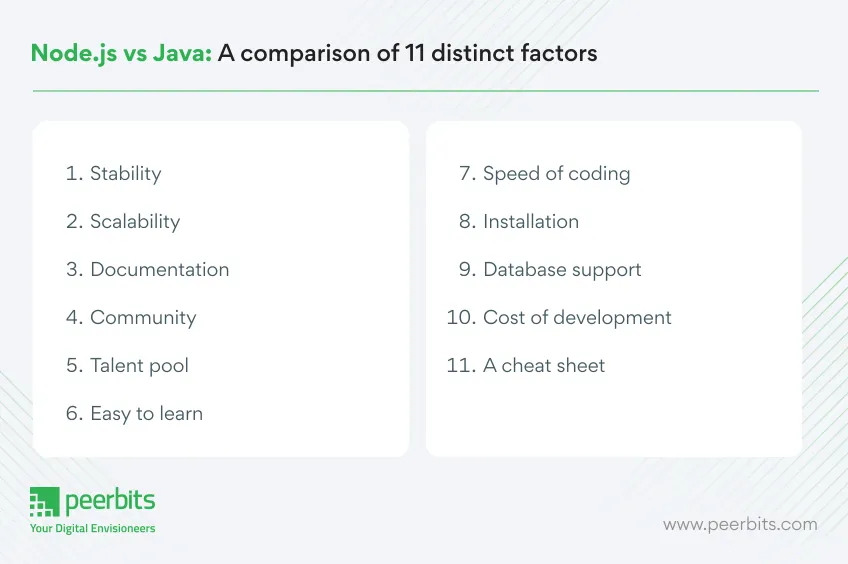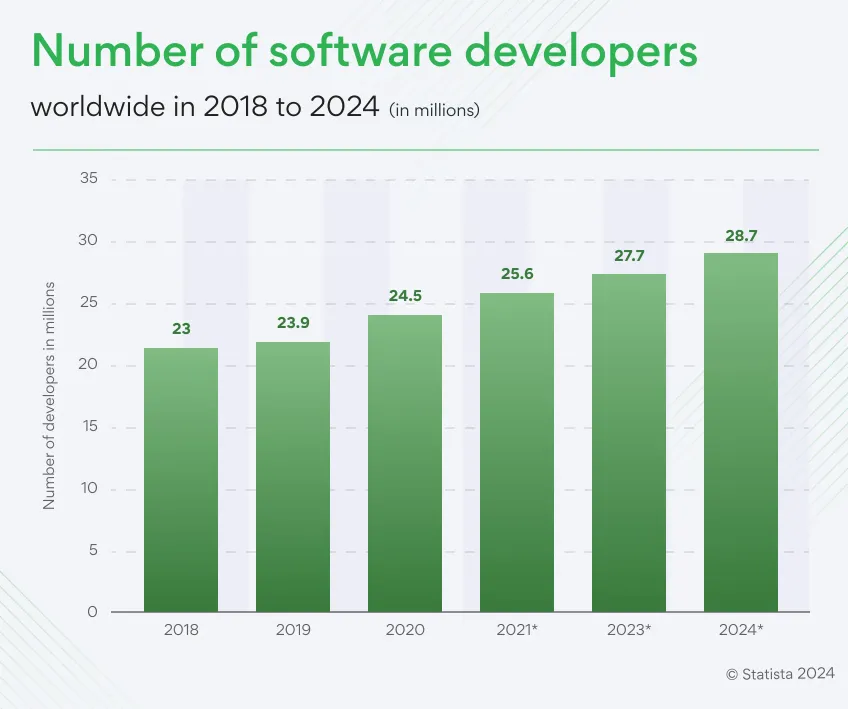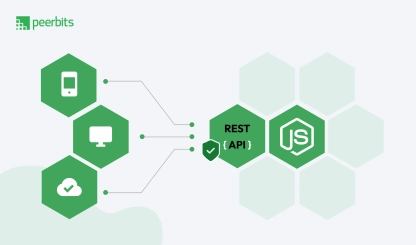Choosing the right backend technology is a critical decision when developing anything from a basic CRUD app to a large-scale enterprise application.
Node.js and Java are two widely-used options that often come into consideration for backend development.
How do you determine which one fits your requirements better?
This guide compares Node.js and Java across 11 key factors to help you select the most suitable backend tech stack for your project. By the end, you'll have a clear grasp of the strengths and limitations of both programming languages, making it easier to decide which one aligns with your goals.
Let's explore!
What is Node.js?
Node.js is a JavaScript runtime environment that allows developers to run JavaScript on the server-side. It uses an event-driven, non-blocking I/O model which makes it lightweight and efficient.
Some key features of Node.js:
- Uses JavaScript for server-side scripting
- Extremely fast due to its non-blocking, event-driven model
- Packaged with npm, the largest ecosystem of open source libraries
- Perfect for building scalable, real-time web applications
- Popular for developing microservices architectures
Due to its speed, scalability, and extensive library support, Node.js has become a popular choice for modern web application development. Companies like Netflix, Uber, Paypal, and eBay all use Node.js extensively in their tech stacks.
What is Java?
Java is a powerful general-purpose programming language that has been around since the 1990s. It is a compiled, object-oriented language that runs on a Java Virtual Machine (JVM).
Some key features of Java:
- Statically typed and strictly object-oriented
- Platform independent - "write once, run anywhere"
- Huge ecosystem of open source libraries
- Very mature technology with extensive documentation
- Heavily used by large enterprises and for mission-critical systems
Java is known for being robust, secure, and reliable. It powers a huge number of websites, applications, and systems. Major companies like Amazon, Netflix, Google, LinkedIn, and more rely on Java for their backend needs.
Node.js vs Java: 360-degree comparison
Node.js offers a game-changing solution. With its JavaScript foundation, Node.js allows developers to use the same familiar syntax for both client and server-side tasks, making for a much faster and more agile workflow compared to traditional methods.
But that's not all, Node.js also has an event loop mechanism that allows for non-blocking server responses, resulting in higher scalability compared to other technologies. And to top it off, developers love Node.js for its lightweight nature, making it a clear winner in terms of ease of use—especially for companies looking to hire web developers efficiently.
Java is a highly reliable and secure programming language that stands out from its rivals, particularly Node.js. One of Java's key strengths is its support for multithreading, which enables the simultaneous execution of multiple processes and efficient use of CPU resources.
Additionally, Java's compilation in bytecode allows for easy portability and platform independence, ensuring that the code can be run on any machine or operating system without modification.
Java's other notable features include robust memory management and concurrent accumulators that contribute to the performance and reliability of the application.

The availability of numerous libraries in both Java and Node.js makes developers' lives a lot easier.
Node.js vs Java: Stability
Java has been around since the mid 90s and is extremely stable and mature. The Java platform has gone through major improvements over decades and Java code written 20 years ago still runs today. Enterprises typically choose Java for mission-critical applications because of its stability and near zero downtime.
Node.js on the other hand is a young technology and only came into existence in 2009. The core API continues to change causing breaks in backward compatibility. However, the release cycles are frequent with new improvements and bug fixes. Over the years, Node.js has become much more stable and enterprises are now trusting it for production workloads.
Node.js vs Java: Scalability
Node.js is a powerful tool for developing highly scalable applications. Its non-blocking input and output system, as well as its event-oriented model, enables it to handle multiple concurrent requests, making it ideal for handling high traffic.
Furthermore, Node.js' event-loop mechanism allows the server to process a large number of requests effectively, providing scalability and efficiency. Additionally, Node.js uses a distributed system for different types of services, which is an added advantage for scalability and efficiency.
Java is a popular choice for enterprise application developmentdue to its scalability and superior performance. However, to fully unlock its potential, developers must implement best practices for adding computational resources such as RAM and CPUs.
Java offers various scaling options including vertical scaling, horizontal scaling and it also addresses the single point of failure issue. Additionally, Java's architecture can cater to all your needs.
Node.js vs Java: Documentation
Documentation pages are an essential resource for learning new languages and understanding their capabilities. The Node.js documentation page offers an extensive overview of the language, including API reference documentation, ES6 features, and guides.
This provides developers with a comprehensive understanding of the most commonly used and niche features of Node.js. Similarly, Java's documentation is a vast database of all language-related information, making it a valuable resource for developers of all skill levels.
Node.js vs Java: Community
One key area where Node.js and Java differ is in community support. According to enterprise apps today, more than 6.3 million websites are using Node.js alone in the United States.
Furthermore, Node.js has gained credibility due to the significant contributions from tech giants such as Facebook, Google, and Amazon. In contrast, Java has a more established community with a longer history of usage and support.
Java, like Node.js, has a strong community that supports the resolution of complex issues. This large community leads to quick bug fixes, regular updates, and ongoing innovation. Currently over 44K+ websites are using Java as a backend.
As one of the top three programming languages, Java has a vibrant community of software developers, making it an excellent choice for businesses looking to hire software developers, gaining easy support from resources such as Coderanch, StackOverflow, Java World, and the Oracle-Java Forum.
Node.js vs Java: Talent pool
The Statista data shows that currently there will be over 28.7 million developers worldwide in 2024. Researchers predict that these numbers will continue to grow in upcoming years.

Node.js ranks 2nd in the "most loved" category for frameworks, libraries, and tools, and 1st in the "most wanted" category. Java also performs well in the survey.
Node.js vs Java: Easy to learn
Node.js has a very shallow learning curve as you only need to know JavaScript. The same language and paradigm is used on both frontend and backend. If you know JS, you can quickly build fullstack apps. Basic constructs like functions, objects, arrays from frontend JS work similarly on the server as well in Node.js.
On the other hand, Java has a steeper learning curve. The syntax is verbose requiring more code, it is statically typed and you need to think about classes, interfaces, access modifiers, etc. JVM languages like Kotlin and Groovy have improved the syntax but base Java remains complex for beginners.
Node.js vs Java: Speed of coding
Both Java and Node.js have extensive collections of community-created libraries and reusable components that make coding easier for developers. However, Node.js has a slight edge in this comparison.
According to Jeff Harrell, former Director of Engineering and Chief Architect at PayPal, Node.js apps require 33% fewer lines of code and 40% fewer files. As a result, on average, the development of Node.js apps takes less time.
It is worth noting that the development time may vary depending on the type of project, the size of the team, and the team's language proficiency.
Java code in contrast is more verbose, requiring a lot of boilerplate code for even simple tasks like file I/O. This can make development slower compared to scripting languages. However, Java's strong typing and conventions also avoid certain classes of bugs.
Node.js vs Java: Installation
Node.js has a very easy installation process. You simply download the installer and Node is ready to go. Node.js runs on Windows, Linux, MacOS - on any system really with great cross-platform support. You don't need a massive IDE, just a lightweight text editor.
Java installation is trickier. You have to install the JDK, an app server like Tomcat and possibly an IDE like Eclipse or NetBeans. There are also multiple JVM languages like Groovy and Scala to choose from which can confuse beginners. Java tools are heavyweight compared to Node.js.
Node.js vs Java: Database support
NodeJS is compatible with a variety of NoSQL and relational databases, but it is especially well-suited for use with a NoSQL database like MongoDB. This is because MongoDB allows for storage of data in JSON objects, which enhances accessibility for backends that are JavaScript-based, such as NodeJS.
Additionally, Node.js has a specialized object data-modeling library that is specifically designed to work with MongoDB. It also improves developer productivity by making the code more readable and flexible.
Java underpins numerous databases and utilizes the standard database connectivity known as Java Database Connectivity for accessing data in applications. Some of the commonly utilized databases are MySQL, SQLite, and PostgreSQL.
In order to build simple projects, developers and programmers utilize built-in Java databases. Moreover, JDBC-enabled databases can solve the problems of relational databases.
Node.js vs Java: Cost of development
According to Glassdoor estimates, the average salary for a Java programmer in the United States ranges between $92K - $135K per year, while Node.js developers make between $89K - 143K.
Whereas in India, a Senior Java developer’s salary ranges from 5K - 6K USD per year. This means that Java development tends to be more affordable in the Indian market.
However, when working with freelancers or outsourcing development, prices can vary greatly. Factors such as project complexity, management, and potential drawbacks all impact cost estimates, making it difficult to provide an exact figure. To get a more accurate idea of the expenses, it is recommended to obtain quotes from multiple Java and Node.js development companies.
Node.js vs Java: A cheat sheet
| Determinant | Node.js | Java |
|---|---|---|
| Performance | It operates extremely fast in a short time period. | Java delivers high-performance capabilities to the applications. |
| Application Architecture | NodeJS uses a single-threaded event loop system or MVP/MVC architecture. | Java developers opt for the model-view-controller architecture for app development. |
| Installation | You need the archive file on your system. | You will have to set the JavaFX environment to execute the JavaFX applications. |
| Testing | NodeJS provides competent testing and debugging abilities. | Java enables testing with FitNess, JMeter, Selenium, JUnit, and Apache. |
| Scalability | NodeJS boasts scalability and efficiency. | Java offers vertical scaling, horizontal scaling, single point of failure, and a single solution for all architecture needs. |
| Microservices Compatibility | NodeJS is highly compatible with the code and service modules. | Java is compatible with the microservice architecture, owing to its frameworks like Spring Boot and Annotation Syntax. |
| Database Support | NodeJS extends its support for all the NoSQL and relational databases. | Java uses MySQL, SQLite, and PostgreSQL. |
| Community Support | Facebook, Google, and Amazon have contributed significantly to the NodeJS environment, thereby turning the NodeJS technology more credible | A broad community implies bug squashing, frequent updates, as well as innovation. |
| Hiring Difficulty | Easy | Easy |
When should you choose Node.js?
Hire Node.js developers for the following purposes:
- Developing web applications for streaming content
- Node.js development services
- Creating high-performing single-page apps
- Building web applications with efficient data processing capabilities
- Developing real-time and multi-user web applications
- Creating browser-oriented game applications.
When should you choose Java?
You can hire Java developers for:
- Custom Java app development
- Building scalable applications
- Creating eCommerce applications
- Developing Big Data applications
- Building cryptocurrency applications with high-level security features
Conclusion
In summary, both Java and Node.js have their own set of advantages and disadvantages, and it is important to understand them in order to make an informed decision for your next project. In terms of speed, Node.js tends to perform better while Java excels in stability and security. Both technologies have strong communities and resources available for developers.
Node.js is commonly used for real-time applications, streaming, big data projects and e-commerce, while Java is best suited for web applications, scientific applications, trading applications and e-commerce. You can choose to hire the best Java development company.
If you are unsure about which technology to choose for your project, it may be helpful to consult experts who are skilled in both technologies and familiar with your specific niche.

FAQ's
It is a matter of debate whether Node.js is more performant than Java or not. Node.js has a non-blocking, event-driven I/O model which makes it well suited for IO-bound and high-performance real-time applications.
Both Node.js and Java have their own unique advantages and disadvantages, and it's always good to evaluate the specific needs of your project and consult with experts to determine the best technology for your use case.
It is difficult to compare the popularity of Node.js and Java, as they are often used in different categories. Node.js is commonly used as a JavaScript runtime environment for building server-side applications, while Java is primarily used as a programming language for developing a wide range of applications.
However, in recent years, Node.js has gained a lot of popularity in the field of web development, especially for building real-time and high-performance web applications. Java, on the other hand, has been around for a longer time and is widely used in enterprise applications, scientific computing, and Android mobile app development. Both technologies have large and active communities, and both are well-documented and supported.
Both Java and Node.js have a bright future in the field of software development, but each technology is better suited for different types of projects.
Java is a mature programming language with a large and active community, which has been around for over two decades.
Node.js, on the other hand, is a JavaScript runtime environment that has gained a lot of popularity in recent years for building high-performance, real-time web applications.
In summary, Java has been around for a long time and has a strong presence in the enterprise market and mobile app development, while Node.js has gained a lot of popularity in recent years for building real-time web applications.
Absolutely. It is important to note that just because a company like Netflix is shifting from Java to Node.js, it does not mean that Java is going extinct. Java is a mature programming language that has been around for over two decades and has a large and active community. It is widely used in enterprise applications and has a strong presence in the mobile app development market, particularly for Android app development.
It is true that some companies are shifting towards Node.js for certain types of projects because of its non-blocking, event-driven I/O model which makes it well suited for IO-bound and high-performance real-time applications. Node.js is also being adopted by more companies as a replacement for traditional web technologies like PHP, Ruby, and Python.
However, it's important to understand that each technology has its own unique advantages and disadvantages, and it's always good to evaluate the specific needs of your project and consult with experts to determine the best technology for your use case. It does not mean that Java is going extinct, it's just that some companies are shifting towards Node.js for certain types of projects.
It is possible to integrate Java and Node.js, one way to do this is by using J2V8, which allows for wrapping Node.js as a Java library and provides access to Node.js API in Java.








